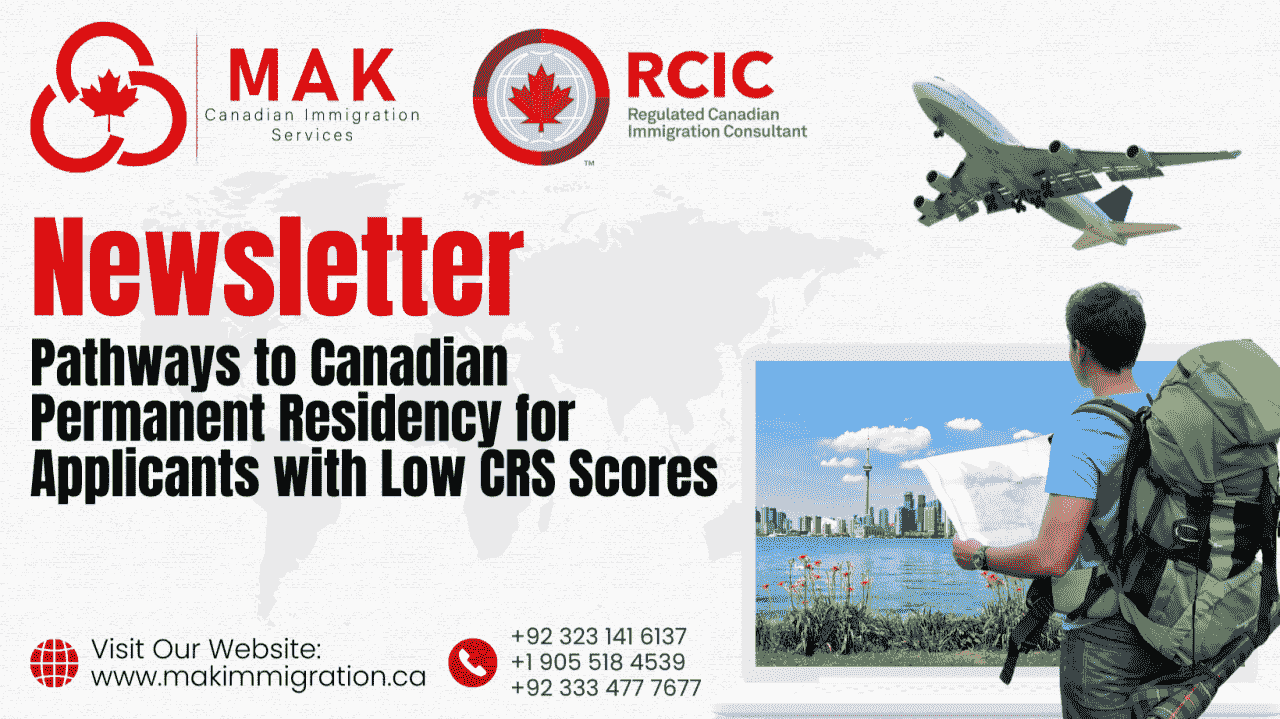Even having a poor Comprehensive Ranking System (CRS) score in Express Entry, foreign people who want to get permanent residency (PR) in Canada have several choices. Although the federal Express Entry system uses category-based draws to predominantly target applicants with high CRS scores, those with lower scores may be able to pursue other options. These consist of immigration pilots, family sponsorship, the Atlantic Immigration Program (AIP), and Provincial Nominee Programs (PNPs). We examine these choices and their requirements below.
1. Programs for Provincial Nominees (PNPs)
One of the easiest routes for candidates with poor CRS scores is the PNP. With the exception of Quebec and Nunavut, every Canadian province or territory runs its own PNP streams that are suited to the demographic and economic demands of the area. Base PNPs and Enhanced PNPs are the two varieties of PNPs.
PNP Requirements by Type Results-Based Procedures It’s PR Base time. Fulfill PNP-specific requirements. The certificate of nomination is required. The process took approximately a year.
Improved PNPs Have a valid EE profile and meet the PNP stream requirements of 600 more CRS points. This process takes approximately six months.
Eligibility:
To be eligible for PNPs, candidates need to:
- Exhibit a desire to live in the province.
- Fulfill requirements unique to the selected PNP stream (e.g., age, education, language proficiency, employment offer, or provincial ties).
By integrating with Express Entry, enhanced PNPs enable 600 CRS points to be awarded to successful nominees, greatly raising their pool ranking and speeding up the application process.
Application Process:
The base of the Application Process PNPs: Apply directly to the province.
Enhanced PNPs: Provincial nomination is the next step after submission via the federal Express Entry system.
While some streams only accept letters of interest (LOIs) or expressions of interest (EOIs), others demand employment offers.
2. Program for Atlantic Immigration (AIP)
The AIP is intended for foreigners who want to relocate to one of the four Atlantic provinces of Canada: Prince Edward Island, Nova Scotia, New Brunswick, or Newfoundland· A and Labrador.
Important Requirements:
- A job offer from a designated employer in an Atlantic province.
- Relevant work experience or education.
- Language proficiency (English or French).
Procedure:
- Receive an offer of employment from a chosen employer.
- Obtain the relevant province’s Certificate of Endorsement.
- While waiting for PR clearance, apply for a two-year work permit or PR.
3. Family Sponsorship
Sponsorship of the Spouse
Canadian citizens or permanent residents may sponsor spouses, common-law partners, and conjugal partners. Applicants must demonstrate the sincerity of their relationship, as it is illegal to marry solely for immigration purposes.
Sponsorship of Dependent Children
This program is open to dependent children of Canadian citizens or permanent residents. Usually, eligibility consists of:
- being unmarried and younger than 22.
- sustained financial reliance if over 22 because of a medical or mental illness.
Program for Parents and Grandparents (PGP)
In order to participate in this lottery-style initiative, candidates must fill out an interest – sponsor form. Parents and grandparents can also apply for a super visa, which permits extended visits for up to five years, although receiving an invitation can be difficult.
4. Immigration Pilots
Immigration pilots, which frequently concentrate on particular businesses or geographical areas, offer temporary options for qualified foreign immigrants. As demonstrated by the Atlantic Immigration Program, successful pilots may develop into permanent initiatives.
Examples
- Agri-Food Pilot: Agricultural workers are the focus of the Agri-Food Pilot.
- Caregiver Pilot: Details of the new programs are still being finalized.
Each program has specific eligibility requirements, and the duration of pilots varies. It’s crucial to submit applications punctually and error-free, as program closures may prevent future opportunities.
Conclusion
Foreign nationals who have low CRS scores don’t have to give up on obtaining permanent residence in Canada. Applicants can discover solutions that fit their particular situation by looking into alternate routes such as PNPs, AIP, family sponsorship, or immigration pilots. Because every program has different requirements, deadlines, and application procedures, it is crucial to conduct in-depth research or speak with immigration experts.
At MAK Immigration Consultants, we specialize in guiding clients through every step of their immigration journey. Whether you’re exploring Provincial Nominee Programs, Family Sponsorship, or Immigration Pilots, our expertise ensures that you receive personalized advice and support tailored to your unique circumstances. Let us help you achieve your dream of Canadian permanent residency. Contact us today!

